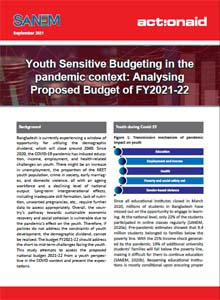SANEM-AAB Policy Brief on Youth Sensitive Budgeting in the pandemic context: Analysing Proposed Budget of FY2021-22
 Citation: Raihan, S., Bidisha, S.H., Sharmin, E., Nahar, M.A., Tasneem, S.T. (2021). Youth Sensitive Budgeting in the Pandemic Context: Analysing Proposed Budget of FY2021-22.
Citation: Raihan, S., Bidisha, S.H., Sharmin, E., Nahar, M.A., Tasneem, S.T. (2021). Youth Sensitive Budgeting in the Pandemic Context: Analysing Proposed Budget of FY2021-22.
Bangladesh is currently experiencing a window of opportunity for utilizing the demographic dividend, which will close around 2040. Since 2020, the COVID-19 pandemic has induced education, income, employment, and health-related challenges on youth. There might be an increase in unemployment, the proportion of the NEET youth population, crime in society, early marriages, and domestic violence, all with an ageing workforce and a declining level of national output. Long-term intergenerational effects, including inadequate skill formation, lack of nutrition, unwanted pregnancies, etc., require further data to assess appropriately. Overall, the country’s pathway towards sustainable economic recovery and social cohesion is vulnerable due to the pandemic’s effect on the youth.
Therefore, if policies do not address the constraints of youth development, the demographic dividend, cannot be realised. The budget FY2021-22 should address the short to mid-term challenges facing the youth. This study attempts to assess the proposed national budget 2021-22 from a youth perspective in the COVID context and present the expectations..
